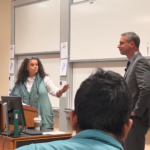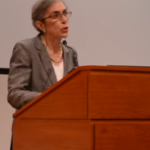Why Academic Departments Should Steer Clear of Activism Against Israel

The obsessive loathing of Israel by large swathes of academia was evident last spring as Hamas showered southern Israeli town with some 4000 rockets and mortars. These woke, virtue-signaling moral narcissists, however, instead of denouncing genocidal aggression on the part of Hamas, of course took it upon themselves to condemn—in the loudest and most condemnatory terms—the Jewish state, not the homicidal psychopaths intent on murdering Jews.
Tellingly silent as rockets were launched indiscriminately by Hamas into southern Israeli towns with the express purpose of murdering Jews (each of which rocket, incidentally, representing a war crime), these virtue-signaling students and faculty only became indignant at the violence and body counts once Israel was forced to protect its citizenry by defensive action to suppress Hamas’s lethal aggression.
Students, faculty, programs, and whole departments on campuses around the world stumbled over each other in the rush to issue “solidarity statements” to express support for the ever-aggrieved Palestinians and to denounce only the military and political response of Israel, assigning complete blame for the present conflict to the Jewish state. The corrosive Palestinian Campaign for the Academic and Cultural Boycott of Israel (PACBI), for instance, crowed that “Statements in support of Palestinian rights, many advocating for BDS, have been endorsed by more than 350 academic departments, programs, centers, unions and societies and garnered nearly 24,000 signatures from scholars, researchers, students and university staff worldwide.”
These statements of solidarity varied slightly depending on the academic discipline of its authors, but there was a commonality to the pseudo-academic language. While the statements claimed to seek “global social justice in [their] intersectional teaching, scholarship, and organizing,” absent from most of the statements was any notice of the injustice and violence currently being meted out against Israelis, either as a result of the shower of some 4300 Hamas rockets launched from Gaza in the latest assault with the intention of murdering Jewish civilians, or the latest conflict as part of an ongoing intifada which has claimed the lives of Israelis who have been injured and murdered by genocidal Arabs wielding knives, guns, rocks, incendiary kites, and even automobiles used as weapons.
But facts and history are not the concern of the morally-elevated professoriate. Based on this politically-charged, biased language, faculty regularly expose that they have, with the breathtaking certainty that only the very sanctimonious and intellectually elite can do, framed the Israeli/Palestinian conflict in such a way that they have determined precisely which side is worthy of opprobrium and which, by virtue of its perennial victimhood, is worthy of complete moral support.
Revealingly, language, for instance, describing “the military, economic, media, and global power that Israel has over Palestine” focuses on the victim-centric, oppression-laden worldview of these academics, in which the legal creation of the Jewish state is framed as an unjust colonial enterprise during which innocent, indigenous Arabs in a factitious country called Palestine experienced a “Nakba,” a catastrophe, in which they were either ethnically cleansed from their lands or remained and now live in the oppressive, apartheid, racist state of Israel.
Individual faculty and students have been condemning Israel every time a new flareup occurs on the Gaza border or elsewhere in the disputed territories of Judea and Samaria, and academic freedom and free speech certainly recognize individuals’ right to express their displeasure with the actions of any nation, regardless of how biased and unreasonable that criticism may be.
But in the latest instance, where hundreds of the statements published about the Spring Gaza conflict were issued by academic departments, not individuals, a more troubling aspect of academic expression showed itself. At the University of Illinois, Urbana-Champaign, as one interesting example, Cary Nelson, former president of the AAUP and professor of English, challenged the propriety of departments authoring statements of support for the Palestinian cause, while vilifying and denouncing Israel in the process. Four academic units at UIUC had issued anti-Israel statements in the Spring, Department of Gender and Women’s Studies, Department of Urban and Regional Planning, Department of Asian American Studies, and the Department of History, prompting Nelson and 43 of his fellow faculty to write a letter to UIUC’s Chancellor Jones and Provost Cangellaris.
In that letter, the faculty noted that “The statements in question were not issued by individual faculty or groups of faculty. They were subscribed to by departments . . . [and] have been placed on websites and disseminated through social media and email, which created the impression that the unit was speaking for all or most of the faculty within it. This represents a worrisome development. And it is worrisome irrespective of one’s views on the dispute between Israelis and Palestinians.”
It is one thing if vicious ideological brats such as the group Students for Justice in Palestine (SJP) publish an expected denunciation of Israel’s behavior after a clash with Hamas and use the tired, one-sided, and historically inaccurate language that characterizes the Jewish state as a colonial, militaristic usurper of an indigenous people’s land, a brutal occupier of “Palestine” to which Jews have no present or past connection and over which they should never have been granted sovereignty. Such slanders animate the entire BDS movement and the ongoing campus war against Israel, Zionism, and Jewish self-determination. Students, however, are young, under-educated, and given to progressive leanings and sympathy with the Palestinians as perennial victims of Israel’s perfidy.
But when whole academic departments—essentially speaking with one voice for an entire academic unit—issue statements of solidarity with the Palestinians, the intellectual carelessness that is apparent in students’ (and, in fact, in much of faculty thinking, too) is unacceptable.
The four statements from the UIUC departments were, sadly, though not unexpectedly, exactly like that: they were peppered with the woke language of oppression and victimization, full of ahistorical analysis, comprised of a one-sided, highly-biased view of a complex issue in which there are clearly nuances and subtleties that need to be considered, and were issued with such a strident and accusatory voice that the righteousness of the ideological stand would have to be unquestioned and morally clear to be justifiable.
Why academic departments in an American university would be taking a moral stand on a political situation in the Middle East in the first place—and not only that, but on behalf of a terror-led genocidal group like Hamas—is another question. And the language here is strident and vicious while being simultaneously inaccurate. The nearly hysterical statement from UIUC’s Department of Urban and Regional Planning, among other slanders, accused Israel of the “illegal occupation of Palestinian land,” a “siege, indiscriminate destruction and massacres in Gaza,” “state sanctioned execution of Palestinian people,” and, echoing the venomous blood libel promoted by Rutgers professor Jasbir Puar, among others, the “deliberate maiming of Palestinian bodies.”
The Executive Committee of the Department of History issued a briefer statement by email that condemned “the state violence that the Israeli government and its security forces have been carrying out in Gaza” and “standing in solidarity with Palestine and support for the struggle for Palestinian liberation,” “liberation” being a euphemism for the Middle East without Israel and free of Jewish sovereignty on Muslim land.
The Department of Asian American Studies, immersed in the ideology of multi-culturalism and the intersectionality of oppression, condemned “the ongoing seventy-three years of settler colonial violence against Palestine and the Palestinian people” and “the exploitation, theft, and colonization of land and labor everywhere, including in Palestine. To this we say no more.” More ominously, the statement read, Israel’s military operations were conducted, not to protect its citizenry from attack, but to obscure its behavior by neutralizing news media. “Israel,” the statement ludicrously contended, “has also destroyed journalistic infrastructures in Gaza, such as the Associated Press building, to prevent this latest massacre from reaching public eyes. Social media accounts have also been hacked and/or censored by tech giants in order to subvert scrutiny.” Apparently, all that energy to hide its behavior from the eyes of the world was unsuccessful, since these woke academics, along with every media outlet on the globe, are intimately aware of every structure demolished and every Arab fatality that can be ascribed to Israel.
UIUC’s Department of Gender and Women’s Studies signed a statement, “Gender Studies Departments in Solidarity with Palestinian Feminist Collective,” along with some 100 other gender studies departments. With the characteristic pseudo-intellectual babble that currently dilutes the scholarly relevance of the social sciences and humanities, the “solidarity statement” pretentiously announced that “as gender studies departments in the United States, we are the proud benefactors of decades of feminist anti-racist, and anti-colonial activism that informs the foundation of our interdiscipline” [sic] and that “‘Palestine is a Feminist Issue.’”
Palestine may be a feminist issue in the addled minds of these academics, but, tellingly, they, and the other departments also, conveniently make no mention in their statements of the terrorist group Hamas which is singularly responsible for initiating this latest clash with Israel. And while these gender studies activists seem so concerned with the emotional and physical welfare of Palestinian women, they do not mention any Israeli women in their statement or commiserate with the reality of living with a genocidal enemy at one’s border.
It should be obvious that there are inherent problems when departments issue statements on controversial topics. In the case of the four statements examined above, (and this was the case in the majority of statements issued from all other universities, as well) the recitation of facts and history lacked context, nuance, and accuracy. The was no mention, for example, of the very significant fact that Hamas, the leadership of Gaza, is a designated terrorist organization and that, since Israel’s disengagement from Gaza in 2005, more than 20,000 rockets and mortars have been launched into Israeli towns with the purpose of murdering Jewish civilians. Hamas’s responsibility for the May conflict was obvious to any sentient observer, yet the statements made no mention of that fact, only Israel’s actions.
It certainly is not an issue that is so morally and ideologically clear that an academic department should commit itself completely to one side of the argument, as these departments have done. In their letter to the provost and chancellor, in fact, the 44 faculty members warned against this very behavior, suggesting that “an academic unit that engages in political advocacy chills robust debate and potentially intimidates scholars who think differently. Can a student expect open inquiry in an environment of mutual respect if his or her department publicly commits to one side in the complicated Israeli-Palestinian dispute? Can a department that calls for the boycott and sanction of Israel (in violation of University policy) study Israeli perspectives as well as Palestinian ones? If a unit denounces Israel in inflammatory prose and promises ‘solidarity with Palestine,’ only a brave untenured faculty member would dare voice a contrary position.”
The larger and more fundamental question, of course, is, what are departments doing in the first place taking a stand on a geopolitical issue, especially when the department is of an academic discipline with no relation to the Middle East? “How does it advance the educational mission of a unit to adopt a foreign policy?,” the letter asked. “The University, and the departmental websites it maintains, are not bullhorns for the amplification of faculty members’ personal politics.”
Recent reports by both The Louis D. Brandeis Center for Human Rights Under Law and the AMCHA Initiative have revealed that anti-Israel activism on campuses has regularly morphed into anti-Semitic speech and behavior, thus creating a hostile climate for pro-Israel and Jewish students, something to which the faculty letter alluded. “Those who are pro-Israel or those who believe that Israelis no less than Palestinians have valid claims and deserve sympathy and understanding may reasonably conclude that they are not welcome in certain departments and that their academic careers may be harmed. Incendiary rhetoric that demonizes Israel makes the campus climate harsher for Jewish and pro-Israel students.”
If an individual academic wishes to take a political stand about Israel, or any other topic, that is of course his or her right. But academic units should avoid speaking on behalf of all of their faculty and students for precisely the reasons outlined above, and particularly when it involves the very contentious and divisive debate over the Israeli/Palestinian conflict.




